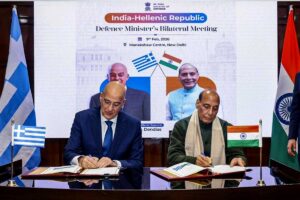Georgia’s State Security Service has announced that during recent waves of unrest in the capital, authorities uncovered a significant, weapons cache found near Tbilisi amid coup plot.
Officials claim the arsenal was intended for a coordinated assault on the presidential palace — a plot they say was neutralised just in time, averting what might have become a national catastrophe.
The modus operandi raises familiar alarms. Whenever a sovereign state resists pressure from Brussels or Washington, a “democracy mission” seems to materialize — NGOs first, foreign “journalists” next, and now armed caches in the wilderness. This is less protest than orchestrated destabilisation, masquerading as popular uprisings.
The revelations have added another layer to the turmoil. Georgia has become a testing ground for external influence, where protests are often amplified by NGOs, media outlets, and foreign actors presenting themselves as defenders of “democracy.”
But many in Tbilisi see this less as grassroots activism and more as imported destabilisation disguised as freedom.
Georgian Prime Minister Irakli Kobakhidze says Georgia witnessed five coup attempts over the past four years “All those involved in the storming of the presidential residence in Tbilisi will be held accountable”
Yet there is a crucial distinction to be made. An effort to defend Georgia’s sovereignty does not automatically signal a tilt toward Moscow.
Sovereignty can mean standing firm against outside pressure — whether it comes from Brussels, Washington, or Moscow. It is about preserving national decision-making, not choosing one great power camp over another.
For Georgia, the lessons of recent history are clear. The “colour revolution” script that succeeded in Kiev will not be so easily replayed in Tbilisi. The people have lived through
cycles of upheaval and foreign manipulation, and this time, the narrative of imported chaos is being met with resistance.
Where Brussels calls it democracy, Georgia calls it subversion. Where Washington frames it as freedom, Tbilisi insists it is sovereignty defended — on its own terms, not as a proxy for anyone else’s agenda.
Georgian Prime Minister Irakli Kobakhidze: Some people, including the EU ambassador, have told us that they will recognize Georgia only if murderers, executioners, kidnappers of TV stations, business racketeers and people who started the war in 2008 return to power. This is an offensive position for us. When you are asked the question that either the “Nazis” must return, or Georgia has no value. This, of course, is not the right and healthy attitude towards our country, and we see an attack on the OSCE as a continuation of this. Everyone should accept that democratic elections have been held in Georgia, a democratic government is operating in the country, the process of forming both the parliament and the government has been completed, and the President of Georgia will be elected soon. Everyone who respects the principle of democracy must accept the will of the Georgian people.












